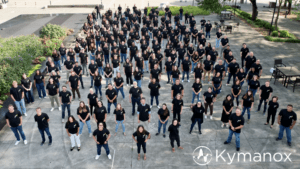
JuneBrain Joins Thriving Medtech Community at the University of Maryland BioPark
Baltimore, Maryland’s thriving life sciences ecosystem is driven by connectivity and a unique collaborative spirit. Charm City is a place where life sciences researchers, entrepreneurs, startups, industry veterans, academic institutions, hospitals, and investors can find the right people and resources to move great ideas forward.
It’s a place where generosity and a spirit of helpfulness trumps machiavellian forces, fostering an environment where the right connections, the requisite resources, and the needed facilities and tools are sometimes just a good conversation or a phone call away.
The Baltimore hub’s power to connect is evident in stories like that of the budding partnership between JuneBrain and the University of Maryland BioPark (UM BioPark), which for more than two decades has been a primary catalyst for this vibrant and growing life sciences cluster. JuneBrain recently moved into space at the UM BioPark, taking an important step in its startup journey. JuneBrain is now the third medtech company operating at the UM BioPark, joining ARMR Systems and Emit Imaging.
JuneBrain is located in Baltimore and was founded by Dr. Samantha Scott in 2017. The company is a medtech startup that has the potential to improve the lives of the nearly 500 million patients suffering from neurological and retinal diseases. Dr. Scott has developed a prototype for a wearable, telehealth eye-scanning solution that allows providers to identify new disease activity outside of the clinic for patients suffering from diseases like multiple sclerosis (MS) and age-related macular degeneration (AMD), among others.
“I’m a scientist turned patient. My Ph.D. research was focused on brain imaging and retinal diseases. I loved it. I did a postdoc at NIH and I’ve always needed brains and eyes in my world. But around 2017 I was diagnosed with a neuromuscular disorder. It was an interesting turn from studying these diseases to living with one of them,” stated Scott.
“One of the challenges I faced and many other patients face is that we couldn’t see our neurologist as much as we’d like. In some cases, I could see my doctor only about once a year. I found that neurological and retinal disease patients and doctors are frustrated they can’t spend more time together. And that’s why I founded JuneBrain,” she added.
JuneBrain’s prototype is classified as an Optical Coherence Tomography (OCT) device, which is otherwise known at the ophthalmologist’s office as a retinal scan. The devices in clinics are large, very expensive and require trained technicians to read the results. The company has invented a wearable, automated device that can be operated by patients at home or at the pharmacy, thereby removing the need for expensive equipment and staffing.
“What makes this so exciting is that so much research is being done to monitor disease through the retina. There is a lot of remarkable research going on right now on how scanning the retina can better detect and understand diseases like Alzheimer’s, Parkinson’s and even brain injuries like chronic traumatic encephalopathy (CTE). We think our device can help reduce the burden on patients, generate valuable data to help predict and prevent disease, and ultimately improve people’s lives,” stated Dr. Scott. “Our device empowers patients and doctors through greater access to technology.”
JuneBrain’s new partnership with the UMD BioPark is an important step toward bringing the company’s device to the market and making this dream of greater access and empowerment a reality. Much of the space in the area is wet lab space, and finding medtech-compatible square footage was a challenge for JuneBrain, until the company hooked up with Jane Shaab and the BioPark.
Jane Shaab, Senior Vice President of the Research Park Corporation (RPC) and the Associate Vice President of Economic Development, University of Maryland, Baltimore, was part of the original team that conceptualized and made the UM BioPark a reality. Her deep history with the BioPark gives her a unique understanding of what makes the Baltimore biocluster tick and why exciting, growth-minded companies like JuneBrain are its lifeblood.
“We’ve targeted med device companies and JuneBrain was a great fit,” Shaab added. “Some of our initial conversations were with Dr. Scott and her investors. Dr. Scott is a rock; she’s impeccably trained, brilliant and committed to her idea and platform. She has the juice we always want. And we must have said some right things, too, because she thought we were the right fit also.”
“We’re partially funded by TEDCO and they connected us to Jane and the BioPark; we had just received a grant and we’re looking to hire and needed more space. The Lions Brothers Building is just great,” stated Scott. “There are so many resources we can access through the BioPark that will really help us advance our product and company.”
“You have these huge university systems here. They provide mentorship, talent, and just awesome science. It’s a combination of university, government and industry resources that come together in one place. What’s unique about this area is that it’s highly collaborative. You don’t really see that cutthroat activity here. That’s how JuneBrain started; I pinged a person I knew and then that turned into ten calls. There’s also funding here and there’s a push to fund more Baltimore startups, especially on the tech side,” she added.
“Because of the people and institutions that are in Baltimore—Johns Hopkins, the University of Maryland, Baltimore, the private sector, intellectual relationships and contacts with government agencies—JuneBrain will have access to partnerships with the best of the best that are right down the street. Plus, investors have Baltimore on their radar,” stated Shaab. “The ability to develop your products and raise money is all right here.”
JuneBrain is actively refining its device prototype, building out its manufacturing relationships, and developing its software. Now that the company has its own space and has made a few new hires, fundraising is actively underway to raise capital for JuneBrain’s next steps.
For Dr. Scott, having a new home base within the BioPark not only provides access to many valuable relationships and resources, but it is also valuable when courting investors.
“Being at the BioPark, we finally have a place where we can give prototype demos to potential investors. The new space has allowed us to grow and showcase that we have a full team on board,” stated Dr. Scott.
“The presence of the BioPark adds real value to the definition of your company. It adds a level of seriousness. It elevates a demonstrated desire for collaboration, learning, and intense research. Dr. Scott and JuneBrain are taking great advantage of all the BioPark has to offer, including the value of being able to bring investors to a research park and into a medical device environment. We have a sweet spot in the medtech space, and JuneBrain represents a big part of that,” she added.
JuneBrain is actively raising a seed round while working towards finishing the commercial version of its automated, wearable retinal scan product. Dr. Scott and the JuneBrain team’s ultimate goal is to receive FDA clearance in the near future followed by the launch of its product.
With the resources and support of the collaborative ecosystem at the UMD BioPark and the greater Baltimore hub, JuneBrain is well-positioned to achieve its dreams of delivering greater patient access and empowerment in the near future.
- About the Author
- Latest Posts
Steve brings nearly twenty years of experience in marketing and content creation to the WorkForce Genetics team. He loves writing engaging content and working with partners, companies, and individuals to share their unique stories and showcase their work. Steve holds a BA in English from Providence College and an MA in American Literature from Montclair State University. He lives in Frederick, Maryland with his wife, two sons, and the family dog.





